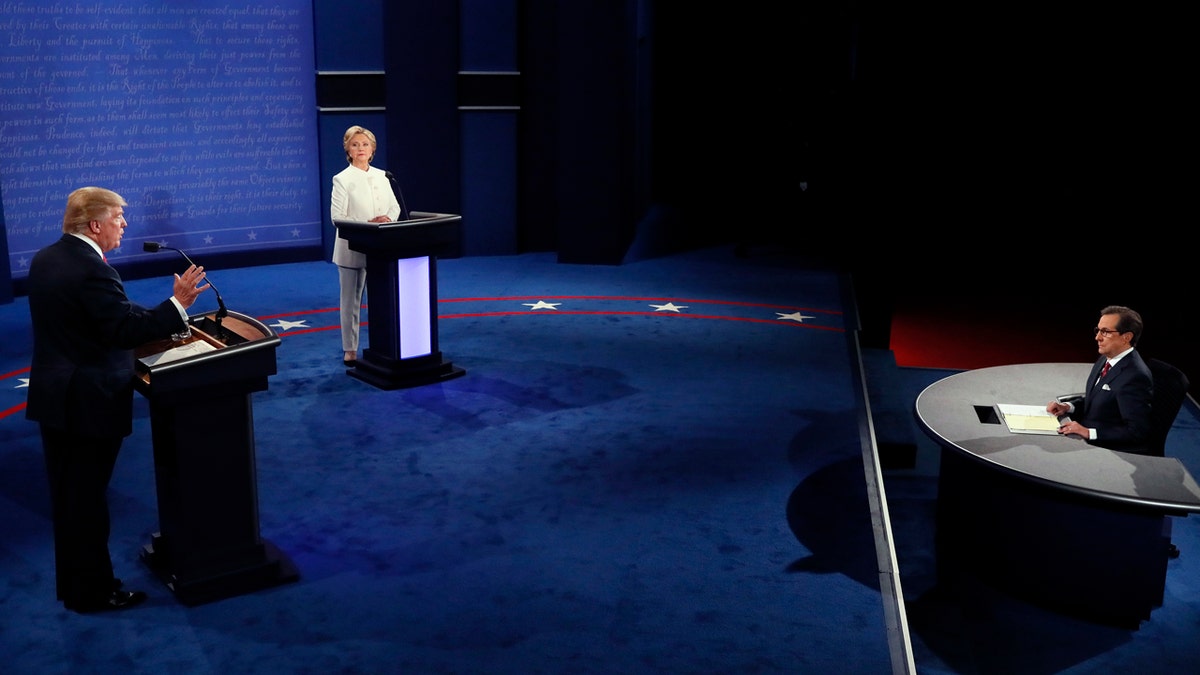
Democratic presidential nominee Hillary Clinton debates with Republican presidential nominee Donald Trump during the third presidential debate at UNLV in Las Vegas, Wednesday, Oct. 19, 2016. (Mark Ralston/Pool via AP)
America is often described as a society without the Old World's aristocracy. Yet we still have people who feel entitled to boss the rest of us around. The "elite" media, the political class, Hollywood and university professors think their opinions are obviously correct, so they must educate us peasants.
OK, so they don't call us "peasants" anymore. Now we are "deplorables" -- conservatives or libertarians. Or Trump supporters.
The elite have a lot of influence over how we see things.
I don't like Donald Trump. I used to. I once found him refreshing and honest. Now I think he's a mean bully. I think that partly because he mocked a disabled person. I saw it on TV. He waved his arms around to mimic a New York Times reporter with a disability -- but wait!
It turns out that Trump used the same gestures and tone of speech to mock Ted Cruz and a general he didn't' like. It's not nice, but it doesn't appear directed at a disability.
I only discovered this when researching the media elite for my TV show. Even though I'm a media junkie, I hadn't seen the other side of the story. The elite spoon-fed me their version of events.
Another reason I don't like Trump is that he supported the Iraq war -- and then lied about that. Media pooh-bahs told me Trump pushed for the war years ago on The Howard Stern Show.
But then I listened to what Trump actually said.
"Are you for invading Iraq?" Stern asked.
Trump replied, "Yeah, I guess ... so." Later, on Neil Cavuto's show, Trump said, "Perhaps (Bush) shouldn't be doing it yet, and perhaps we should be waiting for the United Nations." I wouldn't call that "support" -- the way NBC's debate moderator and many others have.
I was stunned by how thoroughly the media have distorted Trump's position. That's a privilege you get when you're part of the media elite: You get to steer the masses' thinking.
At the second debate, we all know that Trump walked over to Hillary Clinton's podium, as if he was "stalking Ms. Clinton like prey," said The New York Times. CNN said, "Trump looms behind Hillary Clinton at the debate."
Afterward, Clinton went on Ellen DeGeneres' show and said Trump would "literally stalk me around the stage, and I would just feel this presence behind me. I thought, 'Whoa, this is really weird.'"
But it was a lie. Watch the video. Clinton walked over to Trump's podium. Did the mainstream media tell you that? No.
The ruling class has its themes, and it sticks to them.
When Clinton wore white to a debate, the Times called the color an "emblem of hope" and a Philadelphia Inquirer writer used words like "soft and strong ... a dream come true." But when Melania Trump wore white, that same writer called it a "scary statement," as if Melania Trump's white symbolized white supremacy, "another reminder that in the G.O.P. white is always right."
Give me a break.
The ruling class decide which ideas are acceptable, which scientific theories to believe, what speech is permitted.
In the book "Primetime Propaganda," Ben Shapiro writes that the Hollywood ruling class calls conservatives "moral scum."
He says, "If you're entering the industry, you have to keep [your beliefs] under wraps because nobody will hire you ... they just assume you're a bad person."
They won't tell you why you weren't hired. They just tell you, "You weren't right for the part," explains Shapiro. "Talent is subjective, which means that it's pretty easy to find an excuse not to call back the guy who voted for George W. Bush."
Years ago, the ruling class was the Church. Priests said the universe revolved around Earth. Galileo was arrested because he disagreed.
Today, college lefties, mainstream media, Hollywood and the Washington establishment have replaced the Church, but they are closed-minded dogmatists, too.
We are lucky that now we have a lot of information at our fingertips. We don't need to rely on the ruling class telling us what to believe. We can make up our own minds.
